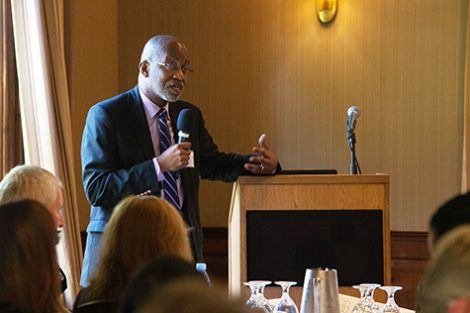October 23, 2018—Efforts by the private sector have potential to close the gap in health equity in the United States. That was the message at the recent Culture of Health (COH) Conference, one of several yearly convening meetings under the three-year Building a Culture of Health: A Business Leadership Imperative initiative, a joint program developed between Harvard T.H. Chan School of Public Health and Harvard Business School (HBS) under the leadership of Principal Investigator Howard Koh, Fineberg Professor of the Practice of Public Health Leadership. This initiative has served as a unique opportunity for the worlds of business and public health leaders to work together, both within Harvard University and outside its walls.
Culture of Health encourages businesses to adopt activities that promote well-being into their regular business practices on behalf of employees, consumers, communities, and the environment. The program, funded by the Robert Wood Johnson Foundation (RWJF), aims to bridge private business and public health and includes six sets of projects focused on research, convening leaders, and training executives to build a COH within their businesses.
Hosted at the Harvard Faculty Club on October 10, 2018, the conference convened COH faculty and staff, their advisory council, representatives from RWJF, and other RWJF COH grantees and partnering organizations. The aim of the conference was for attendees to discuss the role of business in addressing health equity, share what they have learned from their work with the private sector around well-being, and find ways to work together.
The conference began with a roundtable, moderated by Sara Singer, co-principal investigator on the COH program and professor of medicine at the Stanford University School of Medicine, and Rob Huckman, Albert J. Weatherhead III Professor of Business Administration at HBS, during which the six Harvard COH teams presented progress on their project developments and received feedback from an advisory council comprised of representatives from companies such as IBM and Johnson & Johnson, nonprofit organizations such as the American Cancer Association and American Heart Association, and research institutions such as HERO-Health and the National Academy of Medicine.
David R. Williams, Florence Sprague Norman & Laura Smart Norman Professor of Public Health at Harvard Chan School, led a discussion around the vital role the private sector can play in addressing health equity. In the United States, race is the strongest driver of health inequities, even more so than income or education, Williams said. For example, a black college graduate is more likely to die prematurely than a white individual with only a high school education. A reason why this may occur, Williams said, is chronic stress, which can cause wear and tear on the body that increases the risk of chronic diseases. In addition, stress can link to other behaviors such as smoking or overeating that contribute to ill health.
Williams stressed the role the private sector can and should play in reducing these inequities and cited several promising efforts. For example, Walmart is reducing sugar and salt in its packaged foods and adding “Great for You” icons to help consumers make healthier choices. Verizon is requiring its health vendors to have plans to address health disparities and is promoting access to mammography for its employees.
Following Williams’ talk, John McDonough, professor of the practice of public health and director of the Center for Executive and Continuing Professional Education at Harvard Chan School and a co-principal investigator in the COH program, led a discussion with participants about health equity initiatives at their own organizations. These included examples such as convenience store efforts to increase affordable, healthy food options, and a mobile app for kids that promotes physical activity and STEM (science, technology, engineering and mathematics) learning.
To cap off the event, Eileen McNeely, co-director of Sustainability and Health Initiative for NetPositive Enterprise (SHINE) and instructor in environmental health at Harvard Chan School, and George Serafeim, Jakurski Family Associate Professor of Business Administration at HBS, moderated a panel of executives from Ford, General Motors, and Toyota who spoke about efforts by the auto industry to lower emissions, improve vehicle safety, and invest in the communities where they have factories. They said that their companies are thinking about promoting human mobility in new ways—beyond a “box on four wheels”—such as support robots that could help elderly individuals move more easily in their homes. Speakers also touted their investments in public transportation and cultural institutions in their factories’ communities.
Photo: Nilagia McCoy
